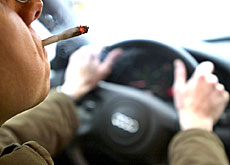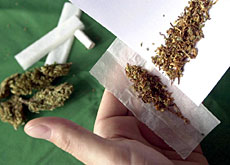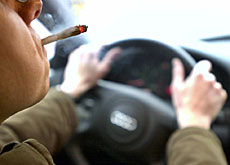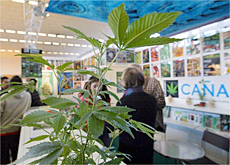Authorities crack down on drugs at the wheel

Anyone caught under the influence of drugs at the wheel faces a minimum three-month driving ban from the beginning of next year.
Saliva tests are also being introduced in a bid to crack down on drivers found to have taken drugs.
The number of drivers who have lost their licence as a result of drug abuse has risen steadily over the past few years.
But the figures jumped by a third in 2003, when more than 670 people lost their right to drive.
Police crackdown
“The police have recently been paying far more attention to this problem,” said Jolanda Van de Graaf, spokeswoman for the Federal Roads Authority.
In over half the cases, the drivers were found to have consumed cannabis. Around 60 per cent of those caught at the wheel were aged between 20 and 29.
In canton Bern alone, road accidents connected to the use of drugs climbed by 12 per cent last year.
Though the figures remain well below those related to alcohol abuse, police officials fear that they are only scratching the surface of a widespread problem.
Last month the Swiss authorities launched a campaign to raise awareness of the risks of driving under the influence of cannabis.
The Road Safety Council wants the public to view so-called “dope driving” and drink driving as equally dangerous.
New guidelines
Under the new guidelines – which were drawn up well before last month’s rejection in parliament of the decriminalisation of cannabis consumption – police will be authorised to carry out tests if they suspect a driver has been using drugs.
Motorists can currently only be ordered to take a blood test if the police have good reason to believe they are putting other drivers in danger.
Police will in future be able to conduct an on-the-spot saliva or sweat test if they have the slightest suspicion that a driver is under the influence.
If the test is positive, they can demand a blood or urine sample to confirm the initial result.
The saliva tests – which are already in use in Germany – have been proven to detect whether a driver has consumed cannabis in around 95 per cent of cases.
Not perfect
“The problem is that [the test’s] validity for other drugs such as cocaine, heroin, morphine and ecstasy has not yet been proven,” said Peter Iten of Zurich University’s legal medicine institute.
“In an ideal world, we would have mobile laboratories to carry out the tests,” he said, “but it is unrealistic to consider this for initial checks.”
The single-use saliva test – known as “drugwipe” – costs around SFr40 ($32).
Cantons Zug and Ticino have been testing it for six months, while Zurich, Aargau and Graubünden are expected to start trials before the end of the year.
In French-speaking Switzerland, Fribourg is the only canton to have begun an evaluation of the suitability of the tests.
Police in cantons Jura and Geneva have no plans to introduce saliva tests in the near future, but Neuchâtel, Valais and Vaud say they could be introduced from January 1.
swissinfo with agencies
According to the Federal Roads Authority, 676 drivers lost their licences last year because they were under the influence of drugs.
Around 60 per cent of those who lost their licences were aged between 20 and 29.
According to a Dutch study, up to five per cent of Europeans drive under the influence of drugs.

In compliance with the JTI standards
More: SWI swissinfo.ch certified by the Journalism Trust Initiative



You can find an overview of ongoing debates with our journalists here. Please join us!
If you want to start a conversation about a topic raised in this article or want to report factual errors, email us at english@swissinfo.ch.